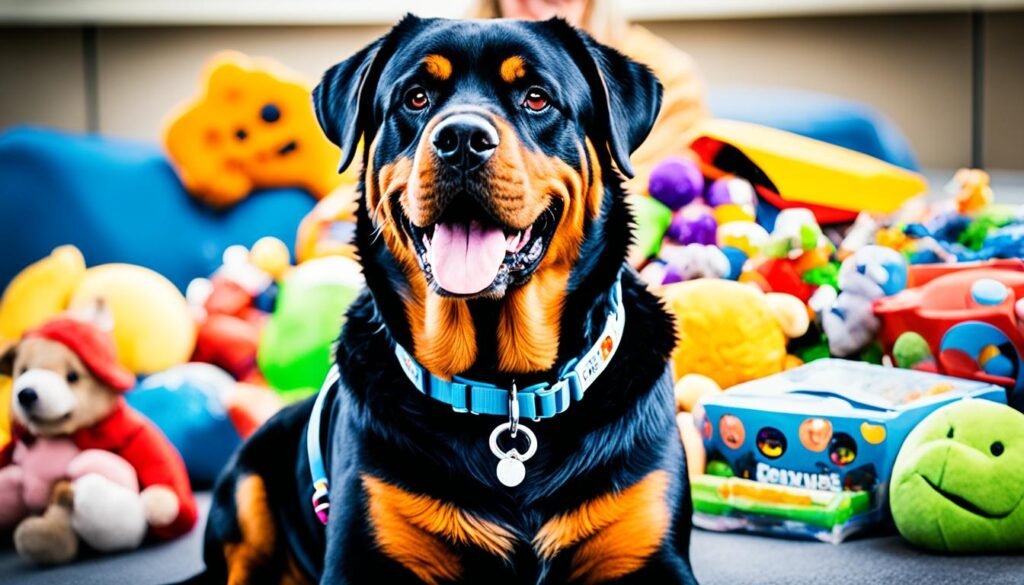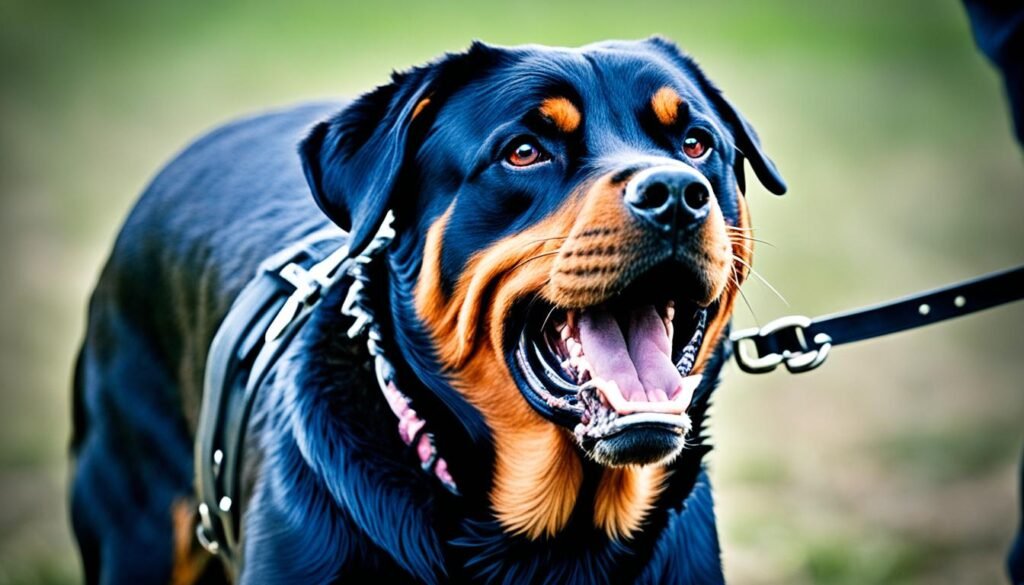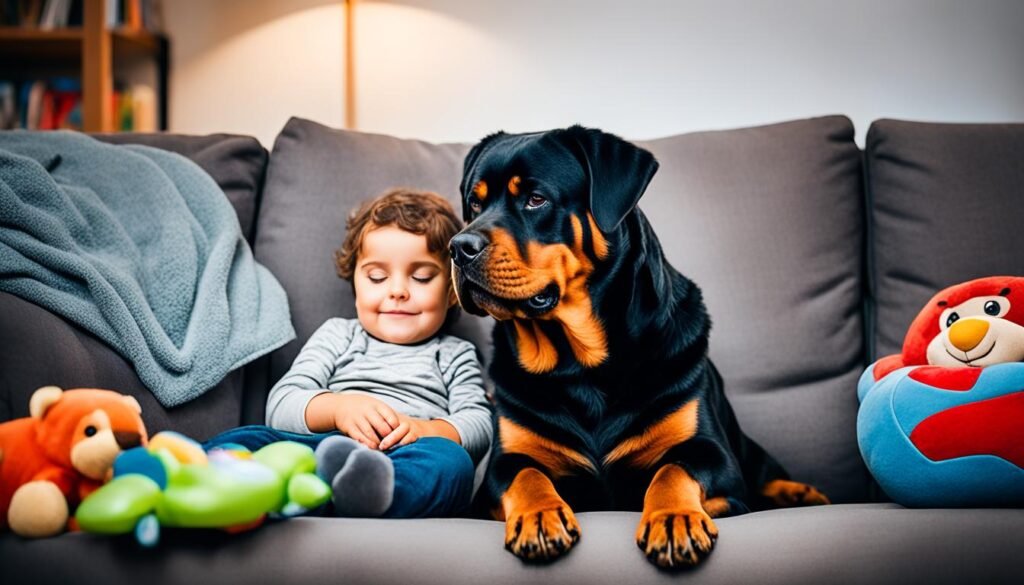As a professional dog trainer, I have encountered many misconceptions about Rottweilers. One of the most common questions I receive is, “Do Rottweilers turn on their owners?” It’s a valid concern, considering the breed’s reputation for aggression. Allow me to tell you a story that sheds light on this topic.
A few years ago, I was approached by a concerned dog owner named Sarah. She had recently adopted a Rottweiler named Max from a rescue shelter. Sarah was worried because Max had shown signs of aggressive behavior towards her and her family members. She was scared and uncertain about whether she could trust Max.
Determined to help Sarah and Max, I began observing their interactions and delving into Max’s background. What I discovered surprised me. Max had been subjected to years of neglect and abuse by his previous owners. He had never received proper training or socialization, which had contributed to his aggressive behavior.
Understanding Max’s background was crucial in addressing his aggression. I started working with Sarah and Max, implementing positive reinforcement training techniques, and gradually exposing Max to new experiences and social interactions. With time, patience, and consistency, Max began to change.
What I witnessed was a transformation in Max’s behavior. He became more responsive to commands, learned to control his impulses, and developed an unbreakable bond with Sarah. The once-aggressive Rottweiler had turned into a loving and devoted companion.
This story highlights an essential truth about Rottweilers. The way they behave towards their owners depends heavily on their upbringing and training. Rottweilers, like any other breed, can exhibit aggression if they have not been properly socialized or trained. However, with the right guidance and care, they can be friendly, loyal, and nurturing pets.
Now that you understand the importance of training and socialization, let’s explore the different types of aggression that Rottweilers may exhibit towards their owners and how to control and manage them.
Key Takeaways:
- Rottweilers’ behavior towards their owners depends on their upbringing and training.
- Rottweilers may exhibit aggression if they have not been properly socialized or trained.
- With the right guidance and care, Rottweilers can be friendly, loyal, and nurturing pets.
- Understanding the different types of aggression in Rottweilers is essential for effective management.
- Professional training and socialization can help control and minimize aggressive behavior in Rottweilers.
Aggression in Rottweilers: Types and Causes
Rottweilers, like any other dog breed, can display different types of aggression. Understanding these types and their underlying causes is crucial in managing and addressing the issue effectively.
Types of Aggression
Rottweilers may exhibit the following types of aggression:
- General Aggression: This refers to unprovoked aggression towards people or other animals.
- Interdog Aggression: Rottweilers may show aggression towards other dogs, especially those of the same sex.
- Protective Aggression: Rottweilers are known for their protective instincts, and they may display aggression when they perceive a threat towards their family or territory.
- Territorial Aggression: Rottweilers can become aggressive when they feel that their territory or personal space is being invaded.
Causes of Aggression in Rottweilers
The aggression exhibited by Rottweilers can have various causes:
- Genes and Temperament: Some Rottweilers may have a genetic predisposition towards aggression. It’s essential to understand a dog’s lineage and temperament before bringing them into your home.
- Influence of Irresponsible Owners and Breeders: Poor breeding practices, lack of socialization, and inadequate training can contribute to aggressive behavior in Rottweilers.
It’s important to note that aggression in Rottweilers is not solely attributed to their breed. Responsible ownership, proper training, and socialization play significant roles in shaping a Rottweiler’s behavior and temperament towards their owners and others.
Controlling Aggressive Behavior in Rottweilers: Training and Socialization

Controlling aggressive behavior in Rottweilers is essential for preventing rottweiler aggression against owners. To prevent aggression, rottweiler training to prevent aggression against owners is crucial. When it comes to managing rottweiler behavior towards owners, understanding rottweiler behavior with owners is key.
Starting training from a young age is crucial in preventing rottweiler aggression against owners. As a rottweiler owner, I believe it is important to seek the guidance of a professional and certified trainer who specializes in rottweilers. They can provide expert advice on effective training techniques tailored specifically to the breed.
Socialization is another crucial aspect of controlling aggressive behavior in Rottweilers. By familiarizing them with various stimuli and exposing them to different situations, we can help them adapt and interact appropriately with humans and other dogs. Introducing them to strangers and visitors also helps minimize their aggressive behavior.
Understanding rottweiler behavior with owners is essential in managing their behavior effectively. By paying attention to their body language and recognizing signs of aggression, we can address their triggers and prevent potential aggressive episodes. Consistency, positive reinforcement, and patience are key in training them to exhibit desirable behaviors and manage any existing aggressive tendencies.
Training Techniques for Rottweilers
- Positive reinforcement: Rewarding desired behaviors with treats, praise, and affection helps reinforce positive associations and encourages them to repeat those behaviors.
- Consistency: Following a consistent training routine and using clear commands helps establish boundaries and expectations, reducing confusion and potential aggression.
- Firm but gentle approach: Rottweilers respond well to confident leadership, so it’s important to be assertive without being harsh or aggressive.
- Redirecting behavior: Providing appropriate outlets for their energy and natural instincts, such as obedience training or engaging in structured play, can help redirect their focus and prevent destructive or aggressive behavior.
By focusing on preventing rottweiler aggression against owners through early training, socialization, and understanding their behavior, we can establish a strong and positive bond with our Rottweilers. With the right guidance and techniques, Rottweilers can become well-behaved, loyal, and loving companions.
Handling an Aggressive Rottweiler: Tips and Techniques

If you find yourself dealing with an aggressive Rottweiler, it’s important to approach the situation with caution and employ effective techniques to manage their behavior. Here are some tips to help you handle an aggressive Rottweiler:
- Understand the cause of aggression: Identifying the underlying cause of your Rottweiler’s aggression is crucial in addressing the issue. Whether it’s fear, possessiveness, or a lack of socialization, determining the root cause will allow you to implement appropriate training methods.
- Avoid triggers: It’s essential to identify and avoid situations or stimuli that may provoke your Rottweiler’s aggression. By removing triggers, you can prevent potential outbursts and make training more effective.
- Systematic desensitization: This technique involves gradually exposing your Rottweiler to the stimulus that triggers their aggression. Start with a low-intensity version of the trigger and gradually increase it over time, rewarding calm and non-aggressive behavior. This method helps desensitize your dog and teach them alternative responses.
- Positive reinforcement: Rewarding passive behavior is a key strategy in managing aggression. Whenever your Rottweiler displays calm behavior or responds appropriately to a trigger, provide praise, treats, or other rewards. This positive reinforcement reinforces good behavior and helps redirect their aggression.
- Seek professional guidance: Consulting with a certified dog trainer or behaviorist who specializes in handling aggressive dogs can be invaluable. They can assess your Rottweiler’s behavior, develop a personalized training plan, and provide ongoing support and guidance.
By utilizing these tips and techniques, you can effectively manage and gradually reduce your aggressive Rottweiler’s behavior. Remember, patience, consistency, and professional guidance are essential in achieving positive results.
Debunking Misconceptions About Rottweilers

There are many misconceptions about Rottweilers that often lead to false beliefs about their aggression and overall temperament. Contrary to popular belief, Rottweilers are not inherently aggressive or dangerous as portrayed in some media and societal narratives. These misconceptions can prevent people from experiencing the true nature of this loyal and loving breed.
It is crucial to understand that Rottweilers, like any other breed, require proper raising and training to reach their full potential as friendly and well-behaved companions. When raised in a nurturing environment with consistent training, Rottweilers can be incredibly loyal and loving towards their owners and families.
One common misconception is that Rottweilers are dangerous with children. However, with proper socialization and training, they can coexist peacefully and form strong bonds with children. Rottweilers have the potential to be patient and gentle, making them suitable family pets when introduced and supervised properly.
Another misconception is that Rottweilers are aggressive towards other animals. While Rottweilers can have a high prey drive, early socialization and positive reinforcement training can help them coexist peacefully with other pets. With proper introductions, supervision, and ongoing training, Rottweilers can become respectful members of a multi-pet household.
There is also a misconception that Rottweilers should be kept as outdoor dogs. In reality, Rottweilers thrive on human companionship and are happiest when they are an integral part of the family. Keeping them outdoors for extended periods can result in loneliness, boredom, and behavioral issues. Rottweilers require regular exercise, mental stimulation, and interaction with their owners to fulfill their social and emotional needs.
Facts About Rottweilers and Dog Attacks

Rottweilers have gained notoriety for their involvement in dog attacks and the significant number of fatalities associated with them. According to a study conducted by the Centers for Disease Control, Rottweilers were found to be responsible for 29 human fatalities in the past 20 years. However, it is crucial to note that the high rate of dog bites attributed to the breed may be more closely linked to irresponsible ownership and the influence of dog fighting enthusiasts rather than inherent genetics.
Rottweilers are known for their watchdog and territorial tendencies, which can make them protective of their owners. Yet, it’s essential to understand that this doesn’t mean they are inherently aggressive towards their owners. Proper training, socialization, and responsible ownership can help manage any potential aggressive behavior.
Rottweiler Attack Statistics
- In the past 20 years, Rottweilers were responsible for 29 human fatalities.
- The breed has been implicated in numerous dog attack incidents.
- High rates of dog bites associated with Rottweilers may be due to irresponsible ownership and dog fighting enthusiasts rather than genetics.
It’s crucial to remember that individual Rottweilers vary in temperament and behavior. Responsible ownership, proper training, and socialization are key factors in raising a well-behaved Rottweiler. Understanding and addressing any potential aggression can help ensure a safe and harmonious relationship between Rottweilers and their owners.
Rottweilers as Family Pets: Loyalty and Training

Despite their reputation, Rottweilers can be loyal and affectionate family pets. With proper training and care, they can become a family’s best friend. Rottweilers have a long history of working with humans and can be trained for various tasks. They require socialization, training, and human companionship to thrive. By treating them with love and kindness, Rottweilers can be loving and loyal companions.
Rottweilers are known for their loyalty towards their owners. Once they form a bond with their family, they will go to great lengths to protect and please them. Their innate protective instincts make them excellent guard dogs, ensuring the safety of their loved ones. However, it is important to channel their loyalty and natural protective tendencies through appropriate training and socialization.
Training is crucial for Rottweilers to become well-behaved family pets. Starting training from a young age is highly recommended to establish good behavior patterns. Basic obedience training, such as teaching commands like sit, stay, and come, is essential for their safety and the well-being of everyone around them. Advanced training can include tasks such as agility training, search and rescue, and even therapy work.
- Socialization: Exposing Rottweilers to different environments, people, and animals from an early age helps them develop appropriate social skills. This prevents them from becoming overly protective or aggressive in unfamiliar situations.
- Exercise: Rottweilers are active and energetic dogs that require regular exercise to stay physically and mentally stimulated. Daily walks, playtime, and interactive toys are necessary for their well-being and to prevent boredom-related behavior issues.
- Consistency and positive reinforcement: Rottweilers respond well to positive reinforcement training methods, such as treats, praise, and rewards. It is important to be patient, consistent, and kind during the training process, promoting a strong bond between the owner and the dog.
By providing a loving and structured environment, Rottweilers can thrive as family pets. Their loyalty, intelligence, and natural instincts make them excellent companions for those who are willing to invest time and effort into their training and socialization. While they may require more attention and care compared to some other breeds, the reward of having a well-behaved and devoted Rottweiler as a family member is immeasurable.
Conclusion
In conclusion, Rottweilers can be wonderful family pets when given the right care and attention. The behavior of these dogs towards their owners heavily relies on how they are raised and trained. While it is true that Rottweilers can exhibit aggression, this can be managed through proper training, socialization, and effective management techniques.
With the right approach, Rottweilers can become loyal, loving, and protective companions for their families. It is crucial to debunk misconceptions about the breed and promote responsible ownership and training practices. By providing Rottweilers with the love, care, and training they need, they can flourish as family pets and bring joy to their owners.
Remember, every dog is an individual, and generalizations should not be made solely based on breed. By understanding and respecting the unique needs and characteristics of Rottweilers, we can create a safe and harmonious environment for both the dogs and their owners. If you are considering a Rottweiler as a family pet, be prepared to invest time and effort into their training and socialization. The rewards of having a well-behaved, loving Rottweiler by your side are immeasurable.
FAQ
Do Rottweilers turn on their owners?
Rottweilers can exhibit aggression, but how they behave towards their owners depends on how they are raised and trained. With proper training and care, Rottweilers can be friendly, loving, and nurturing.
What are the different types of aggression in Rottweilers?
Rottweilers can exhibit general aggression, interdog aggression, protective aggression, and territorial aggression. The causes of aggression can include genetics, temperament, and the influence of irresponsible owners and breeders.
How can I control the aggressive behavior of my Rottweiler?
Controlling aggressive behavior in Rottweilers requires proper training and socialization. Start training from a young age and seek the guidance of a professional trainer. Socialization is crucial to help Rottweilers adapt to different situations and interact appropriately with humans and other dogs.
What techniques can help manage the aggression of an aggressive Rottweiler?
Understanding the cause of aggression is crucial. Avoid triggers that may provoke the dog and use techniques like systematic desensitization and positive reinforcement to redirect the dog’s behavior. Seeking professional guidance from a trainer or behaviorist can also be helpful.
Are Rottweilers inherently aggressive and dangerous?
No, Rottweilers are not inherently aggressive and dangerous. With the right care and training, they can be loyal and affectionate family pets. It is important to debunk misconceptions about the breed and educate people about their true nature.
Are Rottweilers responsible for a significant number of dog attacks?
Rottweilers have been implicated in dog attacks and are responsible for a significant number of fatalities. However, the high rate of dog bites associated with the breed may be attributed to irresponsible owners and dog fighting enthusiasts rather than genetics.
Can Rottweilers be loyal family pets?
Yes, Rottweilers can be loyal and affectionate family pets. They have a long history of working with humans and can be trained for various tasks. They require socialization, training, and human companionship to thrive.
